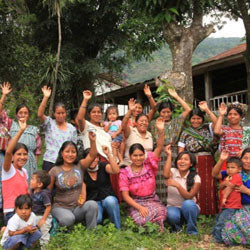The Americas
Aj Quen is made up of 27 artisan groups and employs 800 Mayan women from the Quiché, Cakchiquel, Tzutujil, and Kekche tribes. In addition to empowering women economically, Aj Quen advocates for artisans’ legal rights so that they may have access to the socioeconomic tools necessary for strengthening impoverished Mayan communities.
Allpa provides market access to over 250 women and family workshops throughout Peru and provides them with craft skills training, coaching, and access to low interest loans. Allpa's goal is to turn artisans into entrepreneurs through support, training, and technical assistance.
At Aptec, women from all walks of life come together to practice the traditional art of hand knitting, a skill that has been largely lost due to machine manufacturing. Aptec focuses on providing equal opportunity employment, fair payment, respectful treatment, and transparent supply chains to their artisans.
For more than 30 years, Artesania Sorata has helped to empower indigenous Bolivian women by providing them with artisan job opportunities. Over 100 women create handmade knit pieces, while practicing traditional and environmentally responsible methods of production.
Awamaki works with indigenous Peruvian populations to create handmade knitwear from locally sourced alpaca fiber. The organization also provides education programs and offers small grants to artisan communities.
Initially formed to support women who were widowed as a result of Guatemala’s 15-year civil war, Indigo now works with artisans from many indigenous communities providing craft training and marketing their products to larger markets. Indigo is deeply committed to employing sustainable and eco-friendly practices, most notably with their extensive range of natural dying techniques.
The artisans of Juan Platero create stylish accessories with Mayan flair. The small workshop, located in the outskirts of Antigua, Guatemala, provides home-based income generation projects for women plagued by the unstable job market of the coffee farming industry.
In rural Guatemala, women too often find themselves stuck in a vicious cycle of poverty. Kiej de los Bosques aims to end this cycle of poverty, and in its place establish a “cycle of prosperity.” The organization envisions a world in which communities from around the globe can unite by sharing their stories through their work.
La Casa de Acogida Mantay in Cusco, Peru is a refuge for teenage mothers who have been victims of abuse and are unable to stay with their families. The refuge provides these young mothers and their children with accommodation, medical care, basic and vocational training in a leather workshop.
La Red was founded in 2006 to assist Mexican women displaced from factory jobs in the USA. A majority of La Red artisans live in rural, impoverished communities where they lack access to employment, education, health care and other basic services. La Red supports these women artisans by providing skills training and product design and marketing.
Alivicha provides artisan jobs to women in Peru’s rural areas in addition to campaigning for women’s sexual, reproductive, political, social, and economic rights. The organization gives Peruvian women an opportunity to leave the domestic sphere and “build a relationship with the world,” so that they can realize their full potential and exercise their rights as women.
Maya Traditions aims to empower and improve the quality of life for Mayan women artisans and their families while contributing to the preservation of traditional knowledge, art and culture in Guatemala.Currently, Maya Traditions works with 126 expert weavers and runs a wide variety of social programs that work to further empower artisans and their families.
Mayan Hands is a Fair Trade, non-profit organization that partners with talented Maya women in their quest to bring their families out of extreme poverty, and at the same time, continue living within the culture they cherish.
Naguska is a family-run organization that employs women knitters from the Peruvian highlands. Naguska prides itself on providing constant work to hundreds of artisans, while using their skills to develop unique and modern products.
Pixan is a community-based nonprofit organization that empowers the most isolated and marginalized women from the Highlands of Guatemala. Using the traditional back strap loom, pedal loom, and natural dyes made from bark and flowers, women artisan produce beautiful, contemporary designs.
Proteje aims to preserve and celebrate traditional Mayan weaving practices while providing its 96 women weavers with a way to support their families. Artisans use naturally-pigmented colored cotton to produce their line of eco-friendly home decor items.
Based in Peru, Royal Knit creates hand knit accessories from alpaca and other natural fibers. Established as a small workshop, its early objective was to provide training programs to teach weaving and sewing skills to single mothers and women victims of domestic abuse.
In 2006, three sisters founded Sumaq Qara in the hopes of bringing economic opportunity back to the women of Ayacucho, Peru. Internally displaced from guerrilla warfare or domestic violence, these women are generally unable to earn a living selling their products without Sumaq Qara’s resources and connections to the global market.


















